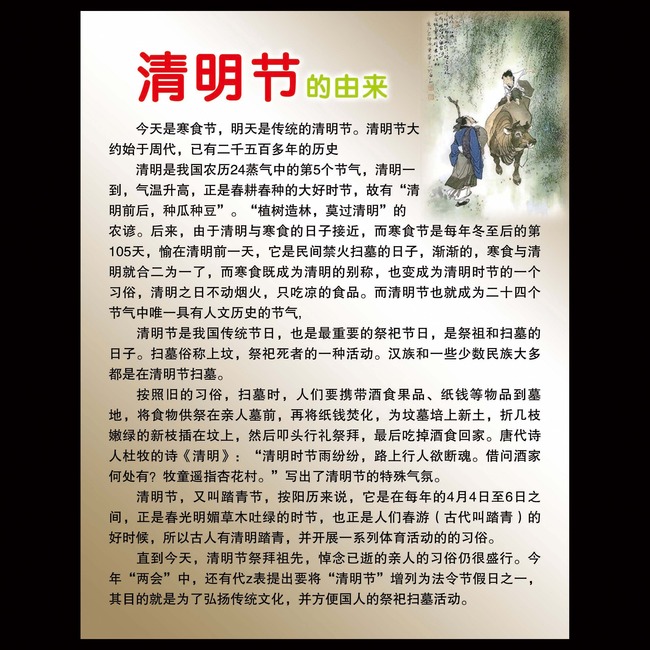【www.gbppp.com--节日知识】
关于清明节的来历说法基本都是一致的,发生这个故事的年代已经很久远了,但人们都不会忘记故事中主人公的忠诚和孝道,值得后人纪念和学习,下面就来介绍清明节的来历。 寒食节,是我国最古老的节日之一。寒食节在清明前一天或几天,说法不一。寒食,顾名恩义,就是不生火做饭,吃冷食。人们为什么要这样做呢?这还得从寒食节的来历说起。传说春秋时代,晋国(今山西省)国君晋献公有五个儿子,他们是:申生、重耳、夷吾、奚齐、卓子。申生是晋献公第一夫人生的,被立为太子。晋献公的后夫人俪姬为了让自己生的儿子美开当太子,阴谋害死了太子申生。为了避免后母骊姬的迫害,公子重耳、夷吾分别逃往国外。晋国贤臣介子推(又叫介之推)等不畏艰难困苦,一直跟随重耳过流亡生活。
介子推的手下人知道了代抱不平,在宫门上贴了一张无名帖,上面写着:有一条龙,奔西逃东;好几条蛇,帮它成功。龙飞上天,蛇钻进洞;剩下一条,流落山中。晋文公看了恍然大悟,他回想起在流亡国外期间,介子推对自己忠心耿耿,如今做了国君忘记了对他奖赏,心里大力不安。接着,重耳赶紧派人找介子推。不久,差人禀报:介子推已进绵山隐居了。深感惭愧的晋文公亲自带人去绵山寻找,然而介子推却避而不见。晋文公知道介子推是个大孝子,他根据别人的建议,火烧绵山,留出一条小道,想趁林中起火后,介于推母子定会出山避火的。可是,一连烧了三夭三夜,数十里森林被火烧为焦土,仍未见介子推母子的人影。大火熄灭之后,人们发现他母子双双抱庄一棵大树烧死了。晋文公对此内疚于心,十分惋惜,便下令把介子椎母子葬于绵山,改绵山为介山,并修建子推祠堂。
后人又把界休县改为介休县。介子推死的时候,正值清明节的前一天。因为他是火饶死的,晋国人为了纪念他,就在他逝世那天不举烟火,进冷食,后来,人们又干脆把它定为寒食节。到了唐朝时,寒食节与清明节合并,寒食禁火习俗逐渐消失。
看来清明节的来历与历史人物介子推有直接的关系,可以看出介子推忠孝不能两全,不过很值得后人敬仰,所以多少年来人们一直纪念他。
清明节发展历史简介
清明节快到了,清明节发展历史你了解吗,今天一起来看看吧、 融合寒食节习俗
清明最早
只是一种节气的名称,其变成纪念祖先的节日与寒食节有关。寒食节是中国古代较早的节日,传说是在春秋时代为纪念晋国的忠义之臣介子推而设立的。其实,从历史的实际来看,禁火冷食主要反映了中国古人改火习俗的遗迹。原始社会,先民们钻木取火,火种来之不易,取火的树种往往因季节变化而不断变换,因此,改火与换取新火是古人生活中的一件大事。春三月正值改火的时节,人们在新火未到之时,要禁止生火。汉代称寒食节为禁烟节,因为这天百姓人家不得举火,到了晚上才由宫中点燃烛火,并将火种传至贵戚重臣家中。
寒食节期间的习俗,主要有禁火冷食和后来成为清明节主要内容的祭扫坟墓。中国古人对祭祀祖先十分重视。上古时候,家中有人去世时,只挖墓坑安葬,不筑坟丘标志,祭祀主要在宗庙进行。后来在挖墓坑时还筑起坟丘,将祭祖安排在墓地,便有了物质上的依托。战国时期,墓祭之风逐渐浓厚起来。 秦汉时代,祭扫坟墓的风气更盛。据《汉书》记载,大臣严延年即使离京千里,也要定期还乡祭扫墓地。在唐代,不论士人还是平民,都将寒食节扫墓视为返本追宗的仪节,由于清明距寒食节很近,人们还常常将扫墓延至清明。诗人们的作品,也往往是寒食、清明并提,如韦应物有诗句说:“清明寒食好,春园百卉开。”白居易也有诗句说:“乌啼鹊噪昏乔木,清明寒食谁家哭。”朝廷鉴于民间寒食、清明并举已相沿成习,就以官方文书的形式正式规定,清明到来时,可以与寒食节一起放假。这项规定距今已经1200多年,说明从那时起清明开始具有某种国家法定节日的色彩。
宋元时期,清明节逐渐由附属于寒食节的地位,上升到取代寒食节的地位。这不仅表上坟扫墓等仪式多在清明举行,就连寒食节原有的风俗活动如冷食、蹴鞠、荡秋千等,也都被清明节收归所有了。
融合上巳节习俗
清明
节后来还吸收了另外一个较早出现的节日—上巳节的内容。上巳节古时在农历三月初三日举行,主要风俗是踏青、祓禊(临河洗浴,以祈福消灾),反映了人们经过一个沉闷的冬天后急需精神调整的心理需要。晋代陆机有诗写到:“迟迟暮春日,天气柔且嘉。元吉隆初巳,濯秽游黄河。”即是当时人们在上巳节祓禊、踏青的生动写照。
约从唐代开始,人们在清明扫墓的同时,也伴之以踏青游乐的活动。由于清明上坟都要到郊外去,在哀悼祖先之余,顺便在明媚的春光里骋足青青原野,也算是节哀自重转换心情的一种调剂方式吧。因此,清明节也被人们称作踏青节。秉性贪玩的孩童,常常不满足于踏青游乐仅仅在清明举行一次,诚如唐代大诗人王维诗句“少年分日作遨游,不用清明兼上巳”。【清明节简介】
后续发展
融汇了两个古老节日精华的清明节,终于在宋元时期形成一个以祭祖扫墓为中心,将寒食风俗与上巳踏青等活动相融合的传统节日。明清大体承接前代旧制,清明节仍然坚持并发展着其在春季生活中一个必不可少的大节的地位。民国时期,清明节这天,除了原有的扫墓、踏青等习俗,植树也被确定为常规项目,这实际上不过是对民间长期延续的植树风俗的一个官方认定。[3] 清明节发展历史如上文
清明节 (April 4)
每年的公历四月五日前后为清明节,是二十四节气之一。今年的清明节是4月4日。在二十四个节气中,既是节气又是节日的只有清明。清明节是我国传统节日,也是最重要的祭祀节日。按照旧的习俗,祭祀(扫墓)时,人们要携带酒食果品、纸钱等物品到墓地,将食物供祭在亲人墓前,再将纸钱焚化,为坟墓培上新土,折几枝嫩绿的新枝插在坟上,然后叩头行礼祭拜,最后吃掉酒食回家。
清明节,又叫踏青节,正是春光明媚草木吐绿的时节,也正是人们春游的好时候,所以古人有清明踏青,并开展一系列体育活动的的习俗。直到今天,清明节祭拜祖先,悼念已逝的亲人的习俗仍很盛行。
Celebrated two weeks after the vernal equinox, Tomb Sweeping Day is one of the few traditional Chinese holidays that follows the solar calendar-- typically falling on April 4, 5, or 6.
Its Chinese name "Qing Ming" literally means "Clear Brightness," hinting at its
importance as a celebration of Spring. Similar to the spring festivals of other cultures, Tomb Sweeping Day celebrates the rebirth of nature, while marking the beginning of the planting season and other outdoor activities.
Qing Ming Jiein Ancient Times
In ancient times, people celebrated Qing Ming Jie with dancing, singing, picnics, and kite flying. Colored boiled eggs would be broken to symbolize the opening of life. In the capital, the Emperor would plant trees on the palace grounds to celebrate the renewing nature of spring. In the villages, young men and women would court each other.
The Tomb Sweeping Day as Celebrated Today
With the passing of time, this celebration of life became a day to the honor past ancestors. Following folk religion, the Chinese believed that the spirits of deceased ancestors looked after the family. Sacrifices of food and spirit money could keep them happy, and the family would prosper through good harvests and more children.
Today, Chinese visit their family graves to tend to any underbrush that has grown. Weeds are pulled, and dirt swept away, and the family will set out offerings of food and spirit money. Unlike the sacrifices at a family's home altar, the offerings at the tomb usually consist of dry, bland food. One theory is that since any number of ghosts rome around a grave area, the less appealing food will be consumed by the ancestors, and not be plundered by strangers.
Honoring Ancestors
Honoring ancestors begins with proper positioning of a gravesite and coffin. Experts in feng shui, or geomancy, determine the quality of land by the surrounding aspects of streams, rivers, trees, hills, and so forth. An area that faces south, with groves of pine trees creates the best flow of cosmic energy required to keep ancestors happy. Unfortunately, nowadays, with China's burgeoning population, public cemetaries have quickly surplanted private gravesites. Family elders will visit the gravesite at least once a year to tend to the tombs.
While bland food is placed by the tombs on Qing Ming Jie, the Chinese regularly provide scrumptious offerings to their ancestors at altar tables in their homes. The food usually consists of chicken, eggs, or other dishes a deceased ancestor was fond of. Accompanied by rice, the dishes and eating utensils are carefully arranged so as to bring good luck. Sometimes, a family will put burning incense with the offering so as to expedite the transfer of nutritious elements to the ancestors. In some parts of China, the food is then eaten by the entire family.
Kites

Besides the traditions of honoring the dead, people also often fly kits on Tomb Sweeping Day. Kites can come in all kinds of shapes, sizes, and colors. Designs could include frogs, dragonflies, butterflies, crabs, bats, and storks.【清明节简介】
《清明》诗多种译本
献花寄哀思,鞠躬敬故人。又是一年清明节,让我们尽情道出对亲人绻绻的思念。历代很多文人都曾将清明节作为诗词歌赋的对象,最熟知的要数唐代诗人杜牧的《清明》了。下面就向大家介绍一下这首诗的几个翻译版本。

原诗:
《清明》
(唐)杜牧
清明时节雨纷纷,路上行人欲断魂。
借问酒家何处有?牧童遥指杏花村。
吴钧陶英译(韵式aaba)
It drizzles thick and fast on the Pure Brightness Day, I travel with my heart lost in dismay.
"Is there a public house somewhere, cowboy?"
He points at Apricot Village faraway.
许渊冲英译(韵式aabb)
A drizzling rain falls like tears on the Mourning Day;
The mourner's heart is going to break on his way.
Where can a wineshop be found to drown his sad hours?
A cowherd points to a cot 'mid apricot flowers.
蔡廷干英译(韵式aabb)
The rain falls thick and fast on All Souls' Day,
The men and women sadly move along the way.
They ask where wineshops can be found or where to rest ----
And there the herdboy's fingers Almond-Town suggest.
孙大雨英译(韵式aaba)
Upon the Clear-and-Bright Feast of spring, the rain drizzleth down in spray. Pedestrians on countryside ways, in gloom are pinning away.【清明节简介】
When asked "Where a tavern fair for rest, is hereabouts to be found",
The shepherd boy the Apricot Bloom Vill, doth point to afar and say. 杨宪益、戴乃迭英译(无韵译法)
It drizzles endless during the rainy season in spring,
Travelers along the road look gloomy and miserable.
When I ask a shepherd boy where I can find a tavern,
He points at a distant hamlet nestling amidst apricot blossoms. 万昌盛、王中英译(韵式aabb)
The ceaseless drizzle drips all the dismal day,
So broken-hearted fares the traveler on the way.

When asked where could be found a tavern bower,
A cowboy points to yonder village of the apricot flower.
吴伟雄英译(韵式aabb)
It drizzles thick and fast on the Mourning Day,
The mourner's heart is going to break on his way.
When asked for a wineshop to drown his sad hours?
A cowboy points to a hamlet amid apricot flowers.
节气清明与清明节简介
清明节的名称与此时天气物侯的特点有关。西汉时期的《淮南子·天文训》中说:“春分后十五日,斗指乙,则清明风至。”“清明风”即清爽明净之风。《岁时百问》则说“万物生长此时,皆清洁而明净。故谓之清明。”虽然作为节日的清明在唐朝才形成,但作为时序标志的清明节气早已被古人所认识,汉代已有了明确的记载。
二十四节气是中国古代天文学家和民众在生活和生产实践中总结出来的气候规律,比较适宜地反映了一年四季气温、物候、降雨等方面的变化,对人们依时安排农耕、蚕桑等活动有不可或缺的指导意义。到了清明,气温变暖,降雨增多,正是春耕春种的大好时节。所以清明对于古代农业生产而言是一个重要的节气。农谚说 “清明前后,点瓜种豆”、“植树造林,莫过清明”,正是说的这个道理。东汉崔寔《四民月令》记载:“清明节,命蚕妾,治蚕
室······”说的是这时开始准备养蚕。其中的“清明节”还只是一个节气,不是节日。
清明节气在时间和天气物侯特点上为清明节俗的形成提供了重要条件,该节气被看作清明节的源流之一。
关于节气清明与清明节,你懂了吗
清明简介
清明,农历二十四节气之一。中国传统的清明节大约始于周代,距今已有二千五百多年的历史。《历书》:“春分后十五日,斗指丁,为清明,时 万物皆洁齐而清明,盖时当气清景明,万物皆显,因此得名。”清明一到,气温升高,正是春耕春种的大好时节,故有“清明前后,种瓜种豆”。清 明节是一个祭祀祖先的节日,主要是扫墓,扫墓是慎终追远、敦亲睦族及行孝的具体表现。清明节是在仲春与暮春之交,也就是冬至后的106天。 2006年5月20日,该民俗节日经国务院批准列入第一批国家级非物质文化遗产名录。另,咏清明诗极多,杜牧《清明》诗最为著名。
清 明 节 习 俗
清明节的习俗是丰富有趣的,除了讲究禁火、扫墓,还有踏青、荡秋千、蹴鞠、打马球、插柳等一系列风俗体育活动。相传这是因为清明节要寒 食禁火,为了防止寒食冷餐身所以大家来参加一些体育活动,以锻炼身体。因此,这个节日中既有祭扫新坟生别死离的悲酸泪,又有踏青游玩的欢 笑声,是一个富有特色的节日.
《途中寒食》
(唐)宋之问
马上逢寒食,途中属暮春。
可怜江浦望,不见洛桥人。
北极怀明主,南溟作逐臣。
故园肠断处,日夜柳条新。
本文来源:http://www.gbppp.com/sh/459321/
推荐访问:清明节简介50字 清明节简介25字